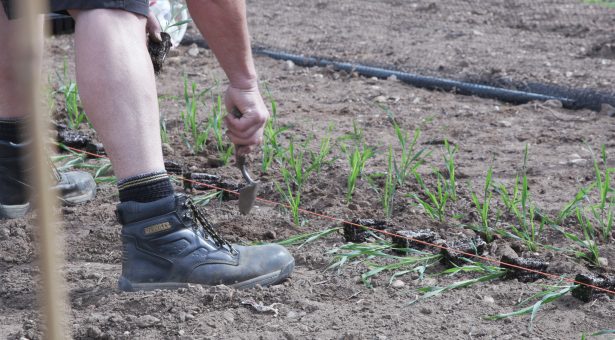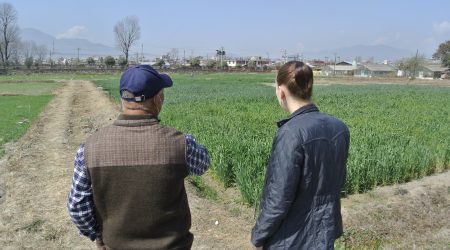Showcasing the region’s food science to attract foreign investment

An ambitious proposal to reinforce Norfolk and Suffolk as the global centre of excellence for plant science with a focus on nutritious food has been backed by the Department for International Trade.
The plan, driven by New Anglia Local Enterprise Partnership’s Norfolk & Suffolk Unlimited inward investment team, Norwich Research Park and other local partners, focuses on attracting businesses to use the region’s globally renowned plant science expertise to develop nutritious food products.
The Department for International Trade (DIT)’s High Potential Opportunities (HPO) programme selects focussed investment opportunities to promote internationally.
Now this new HPO for Norfolk and Suffolk will be promoted by DIT’s global network, showcasing the opportunities internationally and promoting the projects to investors.
Dr Jonathan Clarke Head of Business Development at the John Innes Centre welcomed the designation, “HPO status is important because it promotes the strength of our region internationally. In Norfolk and Suffolk our strength is AgriTech, food and health. The John Innes Centre and our Norwich Research Park partners have a big role to play in this.”
There is a growing global demand for more nutritious food products which improve both physical and cognitive health. This is being driven by governments, consumers and businesses seeking solutions to combat a range of health concerns associated with lifestyle choices and healthy ageing (e.g. obesity, diabetes, cancer, hypertension, osteoporosis and dementia). The link between general health, age, diet and vulnerability to COVID-19 has further brought this to the fore.
One product currently under development by John Innes Centre researchers is a genetically modified (GM) wheat that delivers a two-fold iron increase in hand-milled white flour. Work is underway to breed a non-GM equivalent.
Iron-deficiency anaemia is a significant global health problem particularly in women and with an economic cost from annual physical productivity losses of $2.32 per capita, or 0.57% of the gross domestic product (GDP) in low-and middle-income countries. A diet rich in products such as bread and pasta made from this biofortified white wheat flour could a high daily dose of dietary iron removing the need for supplements.
Core to the HPO is Norwich Research Park, Europe’s largest single-site hub of research, training, education and enterprise focused on plant science, food and health. The Park’s 3,000 researchers and clinicians and around 150 science and technology businesses focus on the full range of technical activities required to research, develop, commercialise, test and market new scientific products.
David Dukes, New Anglia LEP’s Head of Inward Investment, said: “The HPO process will help to raise the profile of our region on the international stage.
“Our scientists are among the most highly cited anywhere in the world and this helps attract the brightest new talent. This HPO will help to focus on commercialising that expertise and using it to attract new business investment.”
“Norfolk and Suffolk is home to 1,000 food and beverage manufacturing businesses employing over 35,000 people. It is the ideal place to develop nutritious food products as it is a world leader in plant science and agri-food.
“The region, famously known as the UK’s ‘bread basket’ due to its ideal growing conditions and fertile soils, combines the country’s most important agricultural economy with world-class plant and food scientists to drive research and generate significant commercial collaborations.”
“Investors will have access to expertise of partners at the Norwich Research Park, a strong agri-food business network and an innovative testbed with new and cutting-edge developments in the pipeline.
“Promotion needs to occur on the international stage as most existing businesses and investors in the field operate overseas, with most growth expected in the USA, Europe and South East Asia. Through active engagement with the international market, this HPO will promote Norfolk and Suffolk as an ideal location for businesses operating in this sector.”
David Parfrey, Chief Executive, Norwich Research Park said: “I am thrilled with the announcement that Norfolk and Suffolk has been successful in gaining HPO status from the Department for International Trade. This will help further promote the commercial opportunities within the Norwich Research Park’s cutting-edge plant and food research sectors, allowing us to continue to spearhead innovation.
“We look forward to working with DIT, New Anglia LEP and other partners to maximise impact for our region. This opportunity to generate significant commercial collaborations will drive innovation and help us achieve our vision to change lives.”
Minister for Investment Gerry Grimstone said: “The UK has so much to offer international investors across a variety of key sectors and regions, with Norfolk and Suffolk setting the national standard for plant science innovation.”
“Increased investment into this new high potential opportunity will ensure that it continues to meet global demand for the life-changing research and products, helping the UK to build back better, and stronger.”
The work behind the HPO bid includes developing a network of commercial opportunities to attract new businesses, both through new companies moving to the
area from overseas and supporting existing businesses to attract greater investment from parent companies. There will also be support for innovative start-ups and early-stage firms to create a dynamic and growing cluster which will continue to attract investment from around the world.
Norfolk and Suffolk is already home to global food and drink brands and more than 1,000 manufacturing businesses employing over 35,000 people.
Alongside a large and innovative agri-food sector and developments like the Food Enterprise Park, the region has the building blocks required to create a world-renowned food-focused plant science cluster which can compete with international hubs including St Louis (Missouri), Memphis (Tennessee) and the Wageningen Food Valley (Netherlands).



